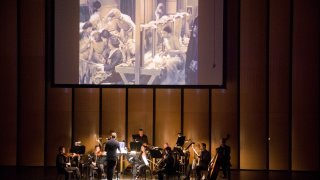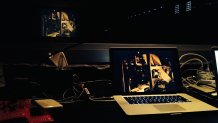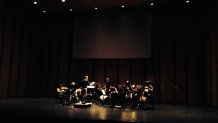
Douglas Pipes likes a good thriller. When the California-based composer created a new score for Alfred Hitchcock’s The Lodger for the Dallas Chamber Symphony, he indulged in the creative freedom the suspense genre allows.

“They do give you a lot of latitude in what you can do with composing for the instrumentation,” Pipes said. “In this case, I do ask the players to do some crazy stuff with their instruments and I even have a request for the players to do a little vocalizing towards the end of it. It’s all subtle stuff, but whatever I’m given, I like to push it to the limits.”
Dallas Chamber Symphony commissioned Pipes, best known for his scores for Monster House and Trick ‘r Treat, to compose the score for The Lodger in 2014. Pipes attended rehearsals and the premiere performance of the score that same year, marveling at the orchestra’s expertise under Music Director Richard McKay’s direction.
Get top local stories in DFW delivered to you every morning. Sign up for NBC DFW's News Headlines newsletter.
“It’s super thrilling to watch one of these shows because they play it all live without a click track,” Pipes said.

A decade later, Pipes returns to Moody Performance Hall in the Dallas Arts District on October 15 to experience the orchestra playing his score for this Hitchcock classic at the movie-in-concert event opening Dallas Chamber Symphony’s 2024-2025 season.
The Scene
The Lodger is one of Hitchcock’s early films, premiering in London in 1927. Based on Marie Belloc Lowndes’ 1913 novel of the same name and Who Is He?, a play co-written by Belloc Lowndes, the film centers on a London family who rents room to a mysterious lodger as police search for a Jack the Ripper-like serial killer. As the serial killer seems to be creeping closer to the family’s neighborhood, they become suspicious of the lodger’s nocturnal activities. The film is Hitchcock’s first thriller.
“As I understand it, this was the first film that Alfred Hitchcock felt like this was a ‘Hitchcock’ film. Now he has found his voice, his style. And so, a lot of the Hitchcock suspense, a lot of the tension and relief, that’s all there. And in the score, I tried to come at it in a way that I would think is an extension of what he would have asked for,” Pipes said. “I went for an approach that I hope he would have signed off on so that it still played to his sensibilities.”
Pipes was also influenced by Bernard Hermann, the American composer and conductor who collaborated with Hitchcock on The Man Who Knew Too Much, Vertigo, North by Northwest, Psycho and The Birds.
“I’m a big Bernard Hermann fan so I think it would also be something that he would say, ‘Yeah, pass the torch and you’ve carried the torch,’” Pipes said.

While modern films require a composer to consider sounds effects and dialogue as well as collaborate with a director, silent films need the score to be more upfront and serve every facet of the story. With The Lodger, Pipes is unable to have a review session with Hitchcock.
“The review session is all internal,” Pipes said.
The full name of the film is The Lodger: A Story of London Fog. Pipes’ score evokes the mysteriousness of the fog by having the clarinet double with bass clarinet, bassoon double with contra bassoon and trombone double with bass trombone.
“I leaned on these instruments in their dense lower registers to give that eerie, ethereal, dense fog aspect to it,” Pipes said.

Because The Lodger is completely silent, Pipes created to score to amplify Hitchcock’s suspenseful storytelling.
“I think it is something that you want the music to illuminate the story and guide the viewer along naturally,” Pipes said. “You don’t want them to think about the music. You want them to feel the music. You want the music to be the guiding light of an emotional journey.”
Learn more: Dallas Chamber Symphony



